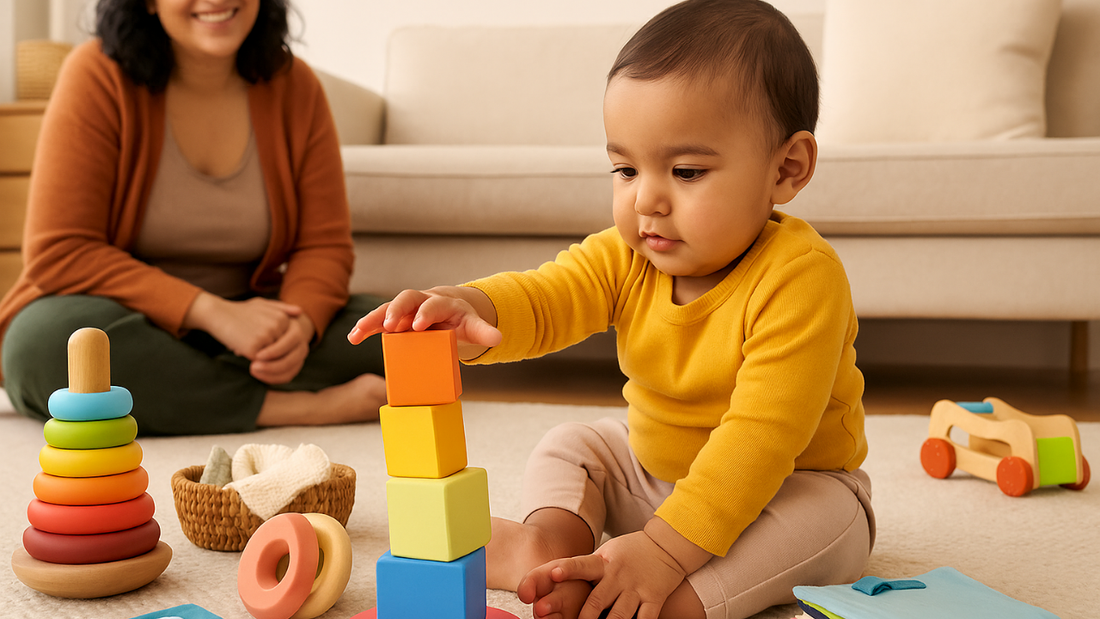
Boosting Baby Brainpower: Easy Cognitive Games at Home
LiLLBUDFrom making eye contact to solving simple puzzles, each moment adds up to massive mental growth. That is why a baby's first few years are full of wonder and brain development. In fact, during the early months and years, the brain forms more than a million neural connections per second!
You are the most significant person in your baby's life as a parent or caregiver. By using daily routines, playtime, and loving interactions, you can enhance your baby’s brain development without complex lessons.
Why Cognitive Play Matters in Early Childhood
Cognitive development means how your baby learns to solve problems, remembers things, and begins to understand the world. Strong cognitive skills lead to better focus, memory, decision-making, and problem-solving later in life.
And the best part? Learning at an early age happens best through play. That’s right - your baby’s brain thrives when you keep things fun, responsive, and interactive.
Easy Cognitive Games to Try at Home
1. Peekaboo with a Twist
Cover a small toy with a scarf and say, “Where did it go?” Wait a few seconds… then ‘ta-da!’- reveal it. Simplest, yet one of the most powerful brain development games for 6-10-month-old babies.
How it helps: Object permanence, memory, and attention
2. Color or shape sorting
Take different types of toys or objects and encourage your toddler to group them by a particular color or by a shape. You can also ask them to find more objects in the house with the same color or shape.
How it helps: Categorization, visual processing
3. DIY Treasure Basket
Place 4-5 household objects with different textures and materials in a basket and let your child explore freely. It can be a combination of spoon, 2-3 different types of fabrics, 1 wooden toy, and anything else. Change the materials weekly to keep curiosity alive!
How it helps: Sensory discovery, decision-making
4. Memory Tray
Place 3 - 4 items on a tray, let your child take a look, then cover the tray and ask what’s missing after removing one. A great way to get toddlers to practice memory around 18–24 months.
How it helps: Working memory, visual recognition
5. Simple Cause-and-Effect Play
Try activities like pressing a light-up button, turning gears, or dropping a ball into a tube. Spin a gear. Your baby learns, "If I do this, that happens!” These activities build connections in the brain - plus, they’re fun!
How it helps: Logic, sequencing, understanding action and reaction
6. Name That Sound
Shake different objects (a jar with rice, a bell, a rattle) behind your back. Let your baby guess the sound. Older toddlers can even try matching the object to the sound.
How it helps: Auditory memory, listening skills
7. Follow the Leader
Do simple actions like clapping your hands, stomping your feet, or waving your arms, and ask your toddler to copy you. This builds cognitive skills like pattern recognition, sequencing, and memory.
How it helps: Attention span, memory, imitation
Using Brain Development Toys Effectively
Toys that get your child to think, solve a problem, and discover something new on their own are some of the best for brain development.
- Open-ended toys like nesting cups or stacking blocks
- Problem-solving toys like puzzles
- Montessori-inspired toys with simple designs
-
Busy boards / cause-and-effect toys that allow experimentation
These brain development toys empower babies to understand the world around them through hands-on learning.
Cognitive Milestones to Watch
Here are some common baby milestones related to thinking and problem-solving:
6–12 Months
- Tries to look for hidden objects
- Explores everything with hands and mouth
-
Begins to understand cause and effect
12–18 Months
- Starts to point towards objects when named
- Imitates simple actions
-
Stacks blocks or inserts items into containers
18–36 Months
- Starts sorting by shape or color
- Simple puzzles get them excited, and they begin to solve them
-
Understands basic concepts like “in,” “on,” or “under”
Every child develops at their own pace, but keeping these milestones in mind helps you understand your toddler’s stage better.
Play Is the Path to Brainpower
Whether it is a 5-minute peekaboo session or fun playtime building towers together, each game you play is a building block in your baby's learning journey. Toys play a nice supporting role to nurture your baby’s brain, but to do it best, you already have the most powerful tool: yourself!

